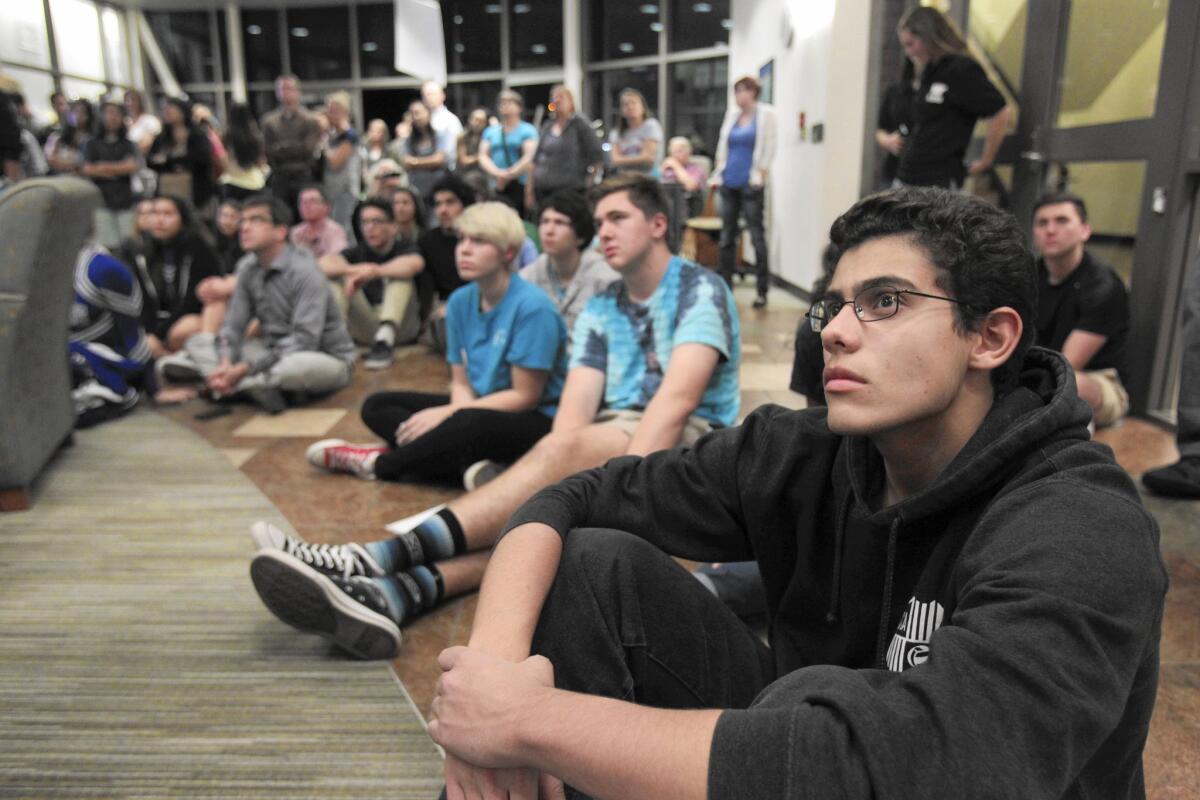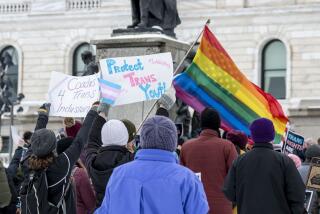Transgender student’s use of locker room causes stir at San Diego high school

REPORTING FROM POWAY, Calif. — A teenager who was born female and uses the boys’ locker room at Rancho Bernardo High School in San Diego has triggered a dispute over a state law that seeks to accommodate transgender students.
A Poway Unified School District board meeting was packed Tuesday night with people raising questions about student rights.
Parent Holly Franz said she learned when the semester resumed three weeks ago that a genetically female student who identifies as male was changing in the locker room.
Franz said she understood that the district must follow the law, but would like the school to make accommodations for others who may feel awkward because of the situation. She also urged that all students be notified if there is a transgender student using facilities where others change clothes.
Transgender rights advocates responded by starting a petition on Change.org asking the district to take no action regarding the issue. As of Tuesday afternoon, about 1,200 people had signed the petition.
Supporters said they did not want the district to make accommodations that would segregate transgender students.
The issue was raised during the public comment portion of the meeting. Trustees could not take action because the discussion was not part of the agenda, nor did they suggest staff consider a course of action.
“My son came home from school and told me there was a girl using the boys’ locker room,” Franz said before the meeting. “This is someone he’s known for years and has always been a girl. My son was very upset by this, and I called the principal.”
Franz said she was not asking for segregation, but would like the school to provide curtains or some other means of ensuring privacy.
Siobhan Garry, 17, a senior at Westview High School in San Diego who started the Change.org petition, had no problem with the idea of creating private changing areas for all students.
“Every student finds changing in the locker room fairly uncomfortable to a certain degree,” said Siobhan, a transgender student who identifies as nonbinary, or not exclusively male or female.
Early on, some districts admitted struggling with the rules that went into effect in January 2014.
The law states that K-12 public school students who are transgender or gender nonconforming are allowed to participate in classes and activities without regard to their birth sex. It also allows transgender students to use bathrooms and locker rooms without regard to their sex at birth.
Supt. John Collins issued a statement before the meeting saying the district had tried to accommodate all students’ rights since the law was implemented.
“Over the past two years, we have worked to ensure every student’s right to privacy, as well as every student’s right to feel safe, valued and included on our campuses,” he wrote.
Kathie Moehlig, a parent in the district who did not address the meeting, said she had been asked to be the spokeswoman for the transgender student’s family.
“This is the first issue I’m aware of that anyone has brought up with AB 1266,” she said. “In working with people at the Transgender Law Center in California, it’s the first one that they know of.”
A representative of the center could not be reached.
Some opponents of the law had predicted problems would arise, including situations where boys would pose as transgender in order to use girls’ facilities. A statewide referendum effort aimed at repealing the law failed in 2014.
Moehlig said she was concerned that the request for student privacy by Franz could result in segregation of transgender students. But if the proposal was for privacy areas that could be used by all students, she said, she would have no objection.
She does, however, oppose the request that the school notify all families if there is a transgender student using a locker room.
“She’s fighting for things that the laws are clear about, and I applaud the district and principal of Rancho Bernardo High School in knowing the law and their legal obligation of protecting the students,” she said.
Christine Paik, Poway Unified’s director of communications, said the district could not disclose that information because of privacy laws.
Franz said she understood the district was following the law but argued that it hadn’t been implemented well. She said she was considering legal action against the state to gain more privacy for students.
Though the law requires school districts to allow transgender students to use restrooms and locker rooms they choose, it does not specify what steps each school should take to accommodate them and other students.
After the law went into effect, a county school official said campuses would address the issue on the individual needs of students and on a case-by-case basis.
“Schools are working with students … based on what they are comfortable with or what their needs are,” said Don Buchheit, senior director for student support services with the San Diego County Office of Education.
In San Diego Unified School District, all schools have private restrooms available for any student to use, and middle and high school students have options for changing in private in locker rooms.
“We haven’t had any issues that I’m aware of like we heard in Poway,” said Linda Zintz, communications director of San Diego Unified.
Zintz said all schools created private areas after the law took effect that could be used by either transgender students or other students in locker rooms.
Warth writes for the San Diego Union-Tribune.
MORE ON EDUCATION
Coddled college students are in for a rude awakening
ICE agents won’t be going onto Los Angeles public school campuses
‘I met Beyonce’: Tears, cheers and hummus as YOLA returns from playing the Super Bowl with Coldplay
More to Read
Sign up for Essential California
The most important California stories and recommendations in your inbox every morning.
You may occasionally receive promotional content from the Los Angeles Times.










